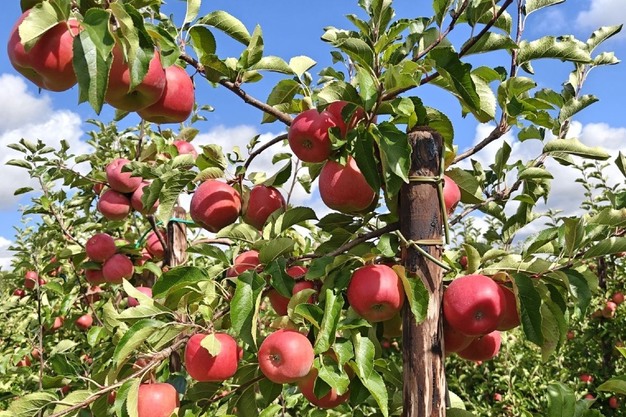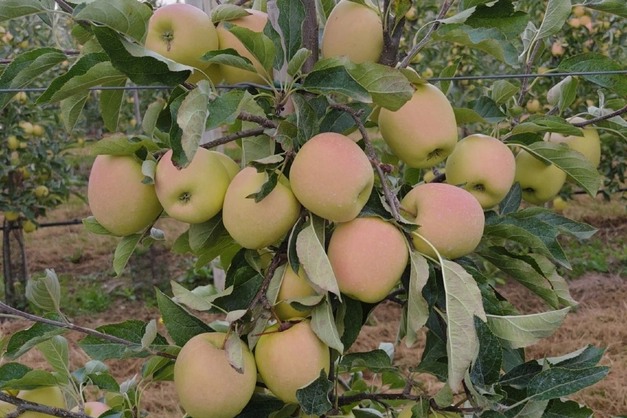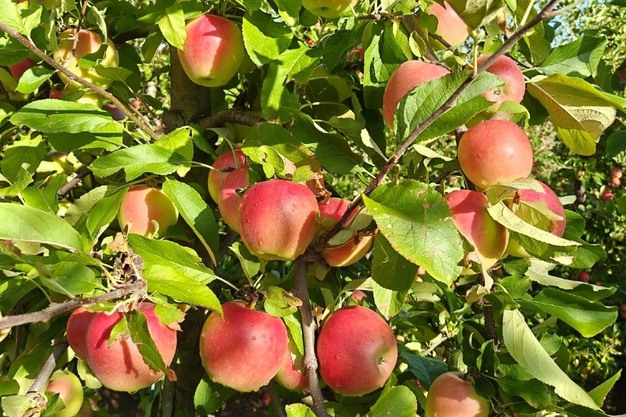In this period around the new harvest, pcfruit is busy researching new hard fruit varieties. More and more often, we see club varieties appearing on the market, but how important are these varieties for the future of Belgian fruit growing, and which varieties predominate in Belgium?
For this purpose, educator Ruben Claes and researcher Ann Gomand will discuss apple varieties in this article. Pears will follow at a later stage. "With changing climatic conditions, monoculture is becoming an increasing problem. Variety with varieties is simply becoming necessary in this respect," the pair points out.
 © Ruben Claes
© Ruben Claes
Bonita Apple
In a rapidly changing cropping landscape, with increasing restrictions on plant protection products and increasingly extreme weather conditions, they say it is more important than ever for fruit growers to think ahead. "If we look to the future, say towards 2030, and the restrictions on plant protection products, it becomes really important to diversify. We will have to focus more on resistant varieties. By then, it will become extremely difficult to grow the current, often disease-sensitive, varieties disease-free with the remaining resource package."
Moving along
That does not mean, they add, that the usual varieties will disappear. "Those classic varieties will remain, but on a larger scale, it will be difficult. I don't want to say that within five years there will no longer be a Jonagold – it will certainly still be there. But the increasing demands around crop protection do force us to look at the diversification of varieties. Most of these new ones being put forward today are robust or resistant varieties. Today, this mainly concerns reduced susceptibility to common scab. In time, other diseases and possibly reduced susceptibility to certain pests will be added. These new varieties are being introduced to the market today in a club format. As a result, growers realise they have to move with it if they want to survive. Here, we are especially looking at younger fruit growers who need to consider this in order to build a future-proof crop."
 © Ruben Claes
© Ruben Claes
Rubis Gold
When asked why these varieties are mostly launched in club format, the pair is clear. "Money. Breeding programmes simply cost too much money. Everything comes with licences these days. So it makes sense for such varieties to be marketed in a club structure. In this respect, marketing is also crucial. A new variety will not succeed if there is no one behind it who supports it commercially. One can be strict or less strict, but there must always be a commercial partner defending and promoting the variety. Without that support, such a variety will not get a chance on the market."
Criteria
So what selection criteria do the pair mostly apply to promising new varieties? "Disease resistance is very important. Most new European varieties already have unilateral or bilateral scab resistance. In the future, there will also be resistance to other diseases and pests. But it remains difficult to estimate where it will go. We also have to realise that club varieties will not necessarily last for 30 years. The cycle will get faster. In the past, you could grow one variety for twenty years, but now we see a faster changeover, depending on market demand, resistance, and other factors. Besides resistance, of course, appearance, flavour, and production potential remain essential. A variety with good resistance but low yield is not financially viable for the grower because planting a club variety is also more expensive than a standard variety, such as Jonagold or Elstar. In addition, sunburn sensitivity, especially with increasing climate fluctuations, and picking window are also considered. A variety whose picking coincides with Conference has no chance of success in Belgium today because growers already have their hands full at that time."
 © Ruben Claes
© Ruben Claes
Kanzi
Looking at the apple club varieties grown on a larger scale in Belgium, Ruben and Ann highlight a few.
Goodness Me®
"A new apple in the Belgian apple landscape, currently advancing to stage 3 in variety research at pcfruit. The variety has double scab resistance, which makes it strong for the future. It is also less prone to sunburn thanks to the white down on the fruit. However, there remains work around rotational susceptibility and strengthening growth via the right rootstocks."
Bonita®
"Originated from a cross between Cripps Pink (Pink Lady) and Topaz. The apple is known for its fresh-sweet taste, crisp texture, and healthy red blush. Bonita possesses one gene that confers resistance to scab; this has already been broken abroad, but in Belgium, no scab has been detected so far, contributing to a more sustainable crop. Currently, the focus is on improving colouring (both for eating quality and avoiding white haze). Leaf blowing is essential for this."
Rubis Gold®
"Cross between Pirouette and Tentation. A yellow apple with an orange blush, robust against scab. The variety is praised for its pronounced crispness and fresh, fruity flavour with a balance between sweet and sour. Thinning is necessary, and short pruning with strong branches is recommended to optimise production."
Morgana®
"A 100% Belgian apple, created from a cross between Golden Delicious and NY75413-30, developed by Better3Fruit. Morgana is bicoloured, juicy and hard, with a balanced sweet flavour. The variety has no particular resistance or robustness, but is growing strongly in Europe. For good fruit set, pollination (20% per plot) is necessary."
Kanzi®
"One of the oldest and most successful club varieties in Belgium, now on the market for over 20 years. Originating from Gala × Braeburn and grown into a consistent world player. Recently introduced the mutant Nicored, which naturally achieves better colouring than the original variety (Nicoter). An area of concern remains susceptibility to fruit tree canker, but through consistent efforts from growers, this remains manageable."
For more information:
Ruben Claes / Ann Gomand
pcfruit
www.pcfruit.be
